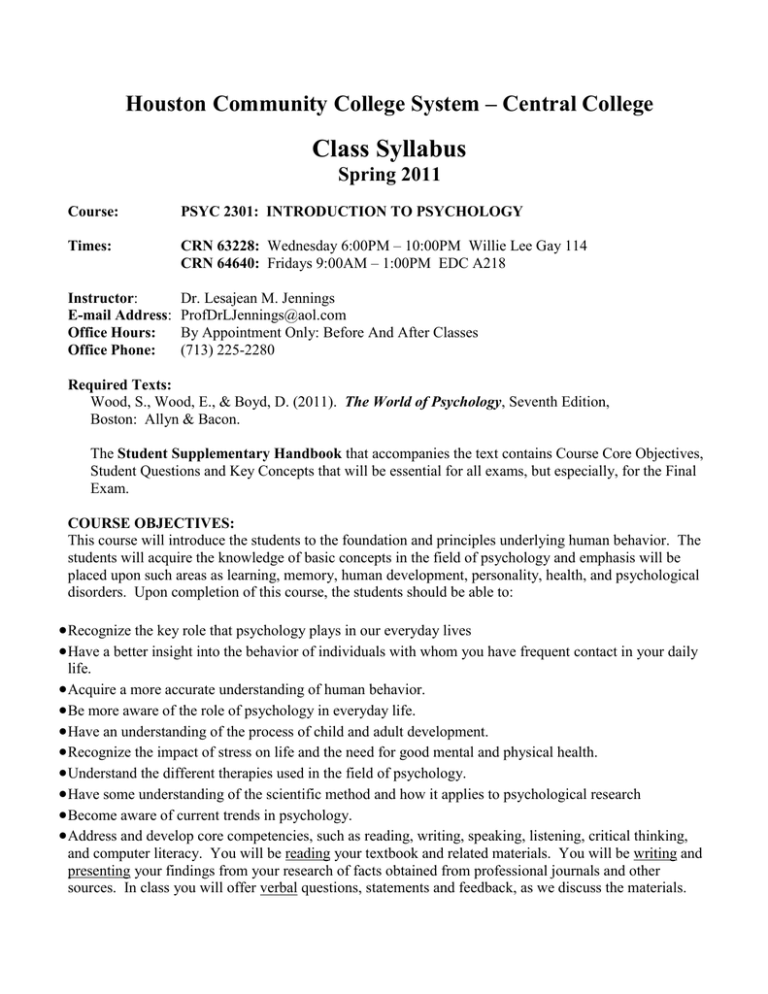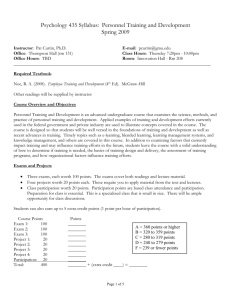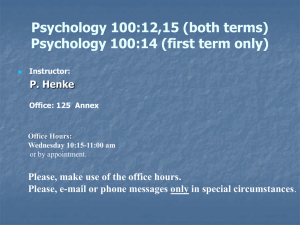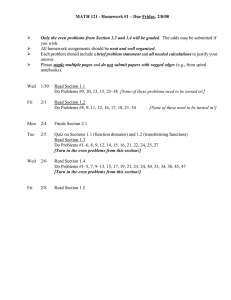SYLLABUS-Jennings-Intro-HCC - Spring 2011-Wed 6pm- Fri 9am.doc
advertisement

Houston Community College System – Central College Class Syllabus Spring 2011 Course: PSYC 2301: INTRODUCTION TO PSYCHOLOGY Times: CRN 63228: Wednesday 6:00PM – 10:00PM Willie Lee Gay 114 CRN 64640: Fridays 9:00AM – 1:00PM EDC A218 Instructor: E-mail Address: Office Hours: Office Phone: Dr. Lesajean M. Jennings ProfDrLJennings@aol.com By Appointment Only: Before And After Classes (713) 225-2280 Required Texts: Wood, S., Wood, E., & Boyd, D. (2011). The World of Psychology, Seventh Edition, Boston: Allyn & Bacon. The Student Supplementary Handbook that accompanies the text contains Course Core Objectives, Student Questions and Key Concepts that will be essential for all exams, but especially, for the Final Exam. COURSE OBJECTIVES: This course will introduce the students to the foundation and principles underlying human behavior. The students will acquire the knowledge of basic concepts in the field of psychology and emphasis will be placed upon such areas as learning, memory, human development, personality, health, and psychological disorders. Upon completion of this course, the students should be able to: Recognize the key role that psychology plays in our everyday lives Have a better insight into the behavior of individuals with whom you have frequent contact in your daily life. Acquire a more accurate understanding of human behavior. Be more aware of the role of psychology in everyday life. Have an understanding of the process of child and adult development. Recognize the impact of stress on life and the need for good mental and physical health. Understand the different therapies used in the field of psychology. Have some understanding of the scientific method and how it applies to psychological research Become aware of current trends in psychology. Address and develop core competencies, such as reading, writing, speaking, listening, critical thinking, and computer literacy. You will be reading your textbook and related materials. You will be writing and presenting your findings from your research of facts obtained from professional journals and other sources. In class you will offer verbal questions, statements and feedback, as we discuss the materials. You will listen to my lectures and student discussions. You will engage in critical thinking as you learn course material and create your written critique. Computer literacy will be demonstrated by completing the Internet based quizzes or studying using your CD-Rom. Houston Community College Mission Statement Houston Community College is an open admission, public institution of higher education offering associate degrees, certificates, academic preparation, workforce training, and lifelong learning opportunities that prepare individuals in our diverse communities for life and work in an increasingly international and technological society. COURSE REQUIREMENTS Grading Your final grade in this course will be dependent upon your performances on: 1) Five Tests (70%) 2) Final Exam (10%) 3) Paper (15%) 4) Oral Presentation (5%) Class Participation is very important as it helps Students to incorporate the information and to make it “make sense” in real world terms, in addition to the very important, book knowledge. Each day you should be prepared with the assigned readings. Be prepared to participate in didactic exercises in class in order to increase skills in these areas. Five Tests (70%) Five tests will be constructed to sample your knowledge of the material as it is presented in your text and in lecture. Each exam will consist of 40 to 60 multiple-choice questions. Some of the questions will come from text materials or information from the lectures. All information presented or assigned in classes, whether it can be found in your text, seen in a film, or lectured on by me, is fair game to end up on a test. You need to study the text materials and your lecture notes in order to be well prepared for each test. Each exam will be graded on a 0-100% scale and the average of all five exams will count for 70% of your final average. Final Exam (10%) The final exam will be comprehensive and will consist of 100 to 120 multiple-choice questions. Paper (15%) You will be required to prepare a five to eight page research paper, which will relate the study of psychology to your chosen discipline, current job or future vocation / occupation. If psychology is your chosen discipline, then write about the area of psychology that you believe that you want to study, or that most interests you; and how you will utilize this in your desired career. Your paper must be five to eight pages long, include at least five references, be typed in APA style, describe your chosen area well and talk specifically about how you will (or are) use the chosen area of psychology in your job or career. HCCS Syllabus – Spring 2011 Page 2 of 10 Final papers will be due at the time of your presentation. Papers may be turned in late, however, five points will be deducted for everyday that the paper is late, including the weekend days. Oral Presentation (5%) You will be required to prepare and present an Oral Presentation that will relate the study of psychology to your chosen discipline, current job or future vocation / occupation. If psychology is your chosen discipline, then talk about the area of psychology that you believe that you want to study, or that most interests you; and how you will utilize this in your desired career. If psychology is your chosen discipline, also discuss the educational and practical requirements that will be necessary for you to work in your chosen field of psychology. Your presentation must: be at five to seven minutes long, describe your chosen area well and speak specifically about how you will (or are) use the chosen area of psychology in your job or career. include a visual aide COURSE EVALUATION Your letter grade will be the number of points you earn of the 100 total possible points. These points will be expressed as a letter grade on the following scale: A = 90-100 B = 80-89 C = 70-79 D = 60-69 F = 59 & below METHODOLOGY This course utilizes lectures given by the instructor, assigned readings, short quizzes, student presentations and other hands-on experiences that will enable you to better understand the subject matter. You are encouraged to give opinions, make comments, or ask questions. INSTRUCTOR RESPONSIBILITIES Prepare class activities, discussions, and lectures. Facilitate an effective learning environment. Prepare class assignments and exams. Evaluate and provide prompt feedback on exams, assignments, and class activities STUDENT RESPONSIBILITIES Attend class, be on time, and participate in class discussions and activities. Read and comprehend the textbook. Complete the required assignments and exams Ask for help when there is a question or problem. Keep copies of all paperwork, including this syllabus, handouts, and all assignments. HCCS Syllabus – Spring 2011 Page 3 of 10 ATTENDANCE AND DROP POLICY It is important that you come to class on time. An instructor may, according to the rules of the college, drop a student after he/she has missed six (6) hours of class time, provided that those six (6) hours are missed prior to the official drop date. MY POLICY IS: In this class, after missing six hours of instruction, provided the six hours are missed prior to the official drop date, students will be dropped. The first week of classes is considered in counting the absences. You may decide NOT to come to class. If this happens too many times, you may suddenly find that you have “lost” the course. Poor attendance records tend to correlate with poor grades. If you miss any class, including the first week, you are responsible for all materials missed. ASSIGNMENTS All assignments are due by the deadline date listed on the course syllabus. Any assignment submitted after the deadline date will be subject to a deduction of five (5) points each day that it is late. MAKE-UP EXAM POLICY Your lowest test grade will be dropped and will not be considered in your final grade average. If an emergency occurs and you must miss a test the missed test will be considered your dropped test grade. If emergencies keep happening to you and you must miss a second exam you may make it up on the day of, and after you have completed, the final exam. All make-up exams will be different exams from the ones that the class took. All make-up exams will be fill-in-the-blank or essay format. Many of my former students have remarked that my make-up tests are very difficult, as they needed to supply all of the information and there were very few multiple-choice questions. All make-up exams will be given on your final exam day after you have completed your final exam. INCOMPLETE POLICY The grade “I” may be given at the discretion of the instructor if for some agreed upon reason you had missed an assignment and 75% of the course have been completed. You are responsible for contacting me and arranging to complete the assignments prior to the following semester. If the work is not completed during the following semester, a grade of “F” will be given as a final grade. CLASSROOM BEHAVIOR Disruptive behavior will not be tolerated. This includes using cell phones, talking in class or any other rude or disrespectful actions to the instructor or classmates. Instructors may drop students who interfere with the academic process. EXTRA CREDIT OPPORTUNITIES: I will offer various extra credit opportunities to the class as the semester progresses. For example, I will offer extra credit for attending and writing a review of a talk or seminar. You must type a one page, APA style, review paper discussing the talk, seminar or activity you attended, including your opinion of the event. These will be on and off campus events and will be worth various amounts of points (i.e. 10 pts, 15 pts), to be applied on your lowest test (s) at the end of the semester. HCCS Syllabus – Spring 2011 Page 4 of 10 You may also earn extra credit by reading and outlining one or more of the following chapters: Chapter 3. Sensation and Perception Chapter 4. States of Consciousness. Chapter 7. Cognition, Language and Intelligence Chapter 10. Motivation and Emotion. Chapter 15 Therapies Chapter 16. Social Psychology. Your outlines must be typed and include sufficient detail to represent the fact that you have read the chapters. Each outline of each chapter will be worth 10 points, which will be added to your cumulative test grades, before the grades are averaged. All outlines are due by or before the last day of classes, as indicated by your syllabus. AMERICANS WITH DISABILITIES STATEMENT Houston Community College System is committed to compliance with the Americans with Disabilities Act (ADA) and the Rehabilitation Act of 1973 (Section 504). Any student with a documented disability (e.g. physical, learning, psychiatric, vision, hearing, etc.) who needs to arrange reasonable accommodations must contact the Disability Support Services counselor at the beginning of the semester. Faculty is authorized to provide only the accommodations requested by the Disability Support Services Office. Please inform the instructor at the beginning of the semester if you have any documented disability that requires instructional modifications. IMPORTANT NOTICE Students who repeat a course three or more times may soon face significant tuition/ fee increases at HCC and other Texas public colleges and universities. If you are considering a course withdrawal because you are not earning passing grades, confer with your instructor/counselor as early as possible about your study habits, reading and writing homework, test-taking skills, attendance, course participation, and opportunities for tutoring or other assistance that might be available. ACADEMIC HONESTY POLICY Academic honesty is the cornerstone of the academic integrity of the college. It is the foundation upon which the student builds personal integrity and establishes a standard of personal behavior. The college can best function and accomplish its mission in an atmosphere of the highest ethical standards. Students are responsible for conducting themselves with honor and integrity in fulfilling course requirements. Penalties and/or disciplinary proceedings may be initiated against a student accused of academy dishonesty. “Academic dishonesty” includes, but is not limited to, cheating on a test, plagiarism, and collusion. Cheating includes test or assignment copying from another student, using unauthorized materials during a test, collaborating with another student during a test, knowingly buying, selling, stealing, transporting, or soliciting in whole or part the contents of a test without authorization, bribing another person to obtain a test. See the current HCCS Student Handbook for definitions of each of there terms. I will not hesitate to apply the appropriate instructor options in the case of scholastic dishonesty. These options range all the way from a warning for more minor offenses to a “ZERO” on the test or other assignments, or under certain circumstances, an “F” for the course. I expect application of this provision to be unnecessary. Cheating in any form will result in a grade of “F” on the exam or project in question and may result in automatic failure of the course. HCCS Syllabus – Spring 2011 Page 5 of 10 SCHOLASTIC HONESTY I expect academic honesty. Scholastic dishonesty includes, but is not limited to, cheating on tests, plagiarism, and collusion. See the current HCCS Student Handbook for definitions of each of there terms. I will not hesitate to apply the appropriate instructor options in the case of scholastic dishonesty. These options range all the way from a warning for more minor offenses to a “ZERO” on the test or other assignments, or under certain circumstances, an “F” for the course. I expect application of this provision to be unnecessary. HCCS Syllabus – Spring 2011 Page 6 of 10 Class Schedule for PSY 2301 – Introduction to Psychology – Spring 2011 CRN 64640 Fridays 9:00AM – 1:00 PM EDC Rm A218 (Second Start is 02/18/2011 – 05/13/2011) Day FRI. Date Feb. 18 Class Topic Second Start Spring Semester classes begin. Review Syllabus and Class requirements. Chapter One: Introduction To Psychology FRI. Feb. 25 Chapter One: Introduction To Psychology Chapter Two. Biology and Behavior FRI. Mar. 4 Test One. Chapters One and Two FRI. Mar. 11 Chapter Five. Learning. Chapter Six. Memory. FRI. Mar. 18 Pass Out Take Home Test Four (Chapters 12 and 13) SPRING BREAK- NO CLASSES Chapter 11. Human Sexuality and Gender Chapter 12. Health and Stress Take Home Test Four (Chapters 11 and 12) FRI. Mar. 25 Test Two. Chapters Five and Six FRI. Apr. 1 Chapter 8. Child Development and Chapter 9. Adolescence and Adulthood FRI. Apr. 8 Test Three. Chapters Eight and Nine FRI. Apr. 15 Chapter 13. Personality Theory and Assessment FRI. Apr. 22 Oral Presentations (10) GOOD FRIDAY- NO CLASS FRI. Apr. 29 Chapter 14. Psychological Disorders. HCCS Syllabus – Spring 2011 Page 7 of 10 Test Four DUE (Chapters 13 and 14) Oral Presentations (10) FRI. May 6 LAST DAY OF CLASS Test Five (Chapters 13 and 14) Oral Presentations (10) FRI. May. 13 Final Exam All Extra Credit Due By or Before Today Mon. May 16 Grades Due by – 12:00 Noon Fri. May 20 Grades Available to Students *Dr. Lesajean M. Jennings reserves the right to change this syllabus and schedule of events at any time. Students will be informed of any changes with as much advanced notice as possible. HCCS Syllabus – Spring 2011 Page 8 of 10 Class Schedule for PSY 2301 – Introduction to Psychology – Spring 2011 CRN 63228 Wednesday 6:00PM – 10:00 PM Willie Lee Gay Hall Rm 114 (Second Start is 02/16/2011 – 05/11/2011) Day WED. Date Feb. 16 Class Topic Second Start Spring Semester classes begin. Review Syllabus and Class requirements. Chapter One: Introduction To Psychology WED. Feb. 23 Chapter One: Introduction To Psychology Chapter Two. Biology and Behavior WED. Mar. 2 Test One. Chapters One and Two WED. Mar. 9 Chapter Five. Learning. Chapter Six. Memory. WED. Mar. 16 Pass Out Take Home Test Four (Chapters 12 and 13) SPRING BREAK- NO CLASSES Chapter 11. Human Sexuality and Gender Chapter 12. Health and Stress Take Home Test Four (Chapters 11 and 12) WED. Mar. 23 Test Two. Chapters Five and Six WED. Mar. 30 Chapter 8. Child Development and Chapter 9. Adolescence and Adulthood WED. Apr. 6 Test Three. Chapters Eight and Nine WED. Apr. 13 Chapter 13. Personality Theory and Assessment Apr. 20 Oral Presentations (5 only) Chapter 14. Psychological Disorders. Apr. 27 Oral Presentations (5 only) Test Four DUE (Chapters 11 and 12) WED. WED. Oral Presentations (all remaining presentations) HCCS Syllabus – Spring 2011 Page 9 of 10 WED. May 4 LAST DAY OF CLASS Test Five (Chapters 13 and 14) WED. May 11 Final Exam All Extra Credit Due By or Before Today Mon. May 16 Grades Due by – 12:00 Noon Fri. May 20 Grades Available to Students *Dr. Lesajean M. Jennings reserves the right to change this syllabus and schedule of events at any time. Students will be informed of any changes with as much advanced notice as possible. HCCS Syllabus – Spring 2011 Page 10 of 10



